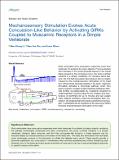Mechanosensory stimulation evokes acute concussion-like behavior by activating GIRKs coupled to muscarinic receptors in a simple vertebrate
Abstract
Most vertebrates show concussion responses when their heads are hit suddenly by heavy objects. Previous studies have focused on the direct physical injuries to the neural tissue caused by the concussive blow. We study a similar behaviour in a simple vertebrate, the Xenopus Laevis tadpole. We find that concussion-like behaviour can be reliably induced by the mechanosensory stimulation of the head skin without direct physical impacts on the brain. Head skin stimulation activates a cholinergic pathway which then opens G-protein coupled inward-rectifying potassium channels (GIRKs) via postsynaptic M2 muscarinic receptors to inhibit brainstem neurons critical for the initiation and maintenance of swimming for up to minutes and can explain many features commonly observed immediately after concussion. We propose that some acute symptoms of concussion in vertebrates can be explained by the opening of GIRKs following mechanosensory stimulation to the head.
Citation
Li , W-C , Zhu , X-Y & Ritson , E 2017 , ' Mechanosensory stimulation evokes acute concussion-like behavior by activating GIRKs coupled to muscarinic receptors in a simple vertebrate ' , eNeuro , vol. 4 , no. 2 , 0073-17.2017 . https://doi.org/10.1523/ENEURO.0073-17.2017
Publication
eNeuro
Status
Peer reviewed
ISSN
2373-2822Type
Journal article
Description
This work was supported by BBSRC (BB/L00111X).Collections
Items in the St Andrews Research Repository are protected by copyright, with all rights reserved, unless otherwise indicated.

